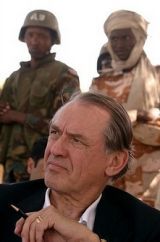UN Darfur envoy says peace process ‘alive’
December 11, 2007 (KHARTOUM) — The UN envoy for war-torn Darfur said in Khartoum on Tuesday that the peace process is alive and that he hopes it will gain pace in the coming weeks.

He said “the peace process is alive and we will try to speed up the process in the coming weeks,” adding that he hoped talks would resume as quickly as possible.
In October, UN- and African Union-brokered talks in Libya, aimed at convincing key rebel leaders to join peace negotiations, quickly collapsed after the main rebel groups boycotted the event.
Eliasson told journalists he had been unable to meet one of the rebel leaders, Justice and Equality Movement chief Khalil Ibrahim, due to fighting in the area. However, he said he had managed to speak with him by telephone.
He said he had also had contacts with Paris-based Abdelwahid Mohamed al-Nur, head of the main Sudan Liberation Movement (SLM).
Asked by Sudan Tribune, al-Nur denied the contacts, adding that last time he met Eliasson was in June when the UN envoy attended Paris Conference on Darfur.
The two groups boycotted the Libyan talks, which Eliasson declined to characterise as a failure, saying they served as a point of departure.
He added that he was noticing a trend towards a regrouping of the splintered rebel groups into three main factions, which he said was positive.
The Sudanese government signed a peace deal with one rebel faction in Nigeria in 2006, but two other groups that took part in those talks declined to sign. Since then, the rebels have become increasingly factionalised.
A 26,000-strong joint UN-AU peacekeeping force is due to be fully deployed some time next year in Darfur, to replace an ill-equipped and under-funded AU force deployed in the region since 2004.
Conflict and famine in Darfur have left at least 200,000 people dead and two million displaced, according to international organisations, since Khartoum enlisted Janjaweed Arab militia allies to put down an ethnic minority revolt in 2003.
Khartoum puts the death toll much lower.
(AFP/ST)
